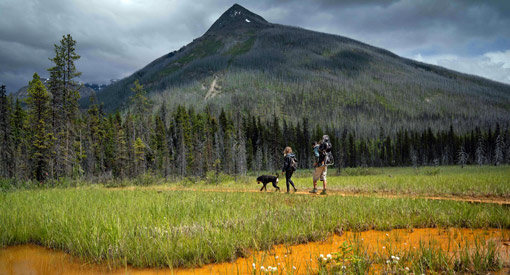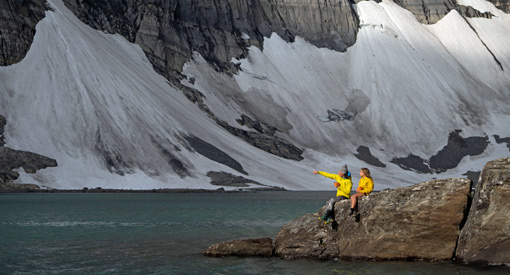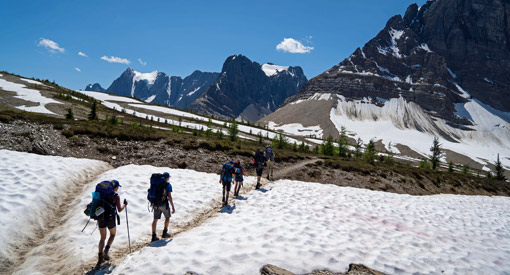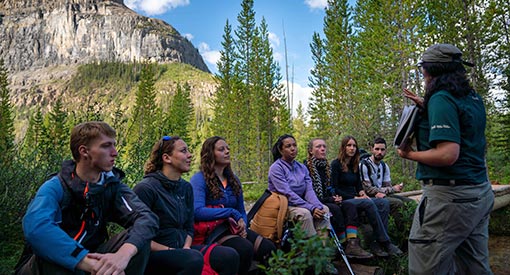
Rockwall Trail
Hiking
Kootenay National Park
With over 200 kilometres of trails, the hard part is fitting it all in. Stop and stretch your legs on an short walk or interpretive trail. Take a day hike to an alpine meadow, backcountry lake or mountain pass. With options for both casual hikers and expert backpackers alike, the choice is yours.
When to go
Prime hiking season runs July through mid-September. Until late June, many passes are still snow-bound and may be subject to avalanche hazard. Trails tend to be muddier at this time and the best hiking is at lower elevations or on drier, south facing slopes in the Radium Hot Springs area. By the middle of July, most alpine passes are snow-free.
Attention Hikers!
Many summer hiking trails are exposed to avalanche hazard throughout the winter and into the late spring. For avalanche safety reasons hiking is not recommended on snow covered trails at and above treeline from mid October to mid June.
Where to go
Safety and trail etiquette
Safety
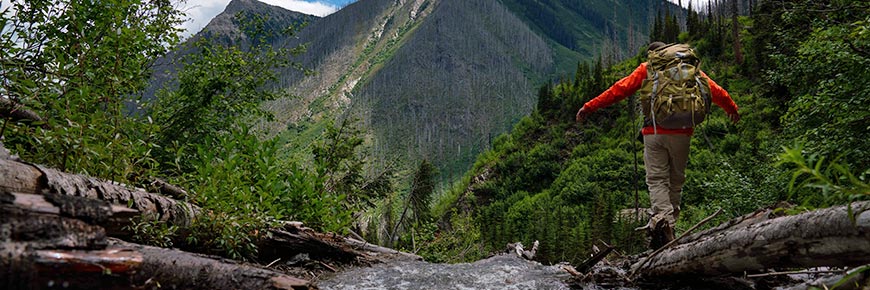
Safety is your responsibility. There are always hazards associated with outdoor recreation. Even short trips can have serious consequences. Minimize your risk by planning ahead.
- Check the weather forecast, current trail conditions, warnings and closures or visit a Parks Canada visitor centre.
- Be prepared for emergencies and changes in weather. Mountain weather changes quickly and it can snow any month of the year. Dress in layers, bring extra food and warm clothing.
- Study descriptions and maps before heading out. Always choose a trail suitable for the least experienced member in your group.
- Bring your own water. Surface water may be contaminated and unsafe for drinking.
- Carry a first aid kit and bear spray.
- Tell a reliable person where you are going, when you will be back, and who to call if you do not return: Parks Canada Dispatch – 403-762-1470.
- Ticks carrying Lyme disease may be present in the park. It is important to check yourself and your pet after hiking.
- Avoid wearing earbuds or headphones. Be alert at all times.
- In case of EMERGENCY, call 911 or satellite phone: 403-762-4506. Cell phone coverage is not reliable throughout the national park.
Snowy trails
Snow can remain on some trails well into the summer. When trails are snow covered, route finding can be difficult and travel through deep snow or on hard snow and ice can be unsafe. Be prepared and check trail conditions before heading out.
Seasonal avalanche risk

Trails above tree line (2,000 m) may be exposed to avalanche hazard at any time of the year and especially from November through June. Steep slopes that are snow covered have the potential to avalanche. For more information on the avalanche hazard, visit a Parks Canada visitor centre or check the Mountain Safety section.
Trail Etiquette
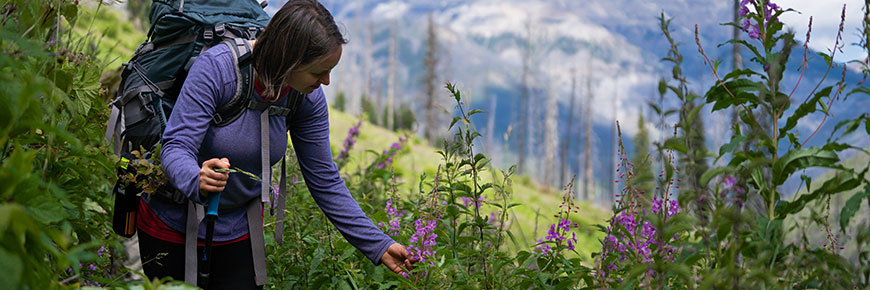
Show courtesy to fellow trail users!
- Leave what you find —it is the law. Natural and cultural resources such as rocks, fossils, artifacts, horns, antlers, wildflowers and nests are protected by law and must be left undisturbed for others to discover and enjoy.
- Dispose of human waste at least 100 m from any water source. Bury solid human waste in a hole 15 cm deep. Pack out your toilet paper.
- To prevent damage to vegetation, stay on designated trails at all times.
- Trails are used by a variety of outdoor enthusiasts. Be sure to yield to others.
- Leave no trace. Pack out everything you pack in.
Wildlife and people

Kootenay National Park is home to wildlife including elk, wolves, cougars, grizzly bears and black bears. To successfully raise their young and sustain a healthy population, wildlife need access to as much quality habitat with as few human surprises as possible.
Be aware of possible encounters with wildlife in all areas of the park, including paved trails and roads.
Tips
- Always carry bear spray, ensure it is accessible, and know how to use it before heading out.
- Make noise. Being quiet puts you at risk for sudden wildlife encounters. Be alert through shrubby areas and when approaching blind corners. Travel in tight groups and always be aware of your surroundings.
- Report bear, cougar, wolf and coyote sightings and encounters to Parks Canada Dispatch when it is safe to do so: 403-762-1470.
- Keep dogs on leash and under control at all times.
More information
- Date modified :
